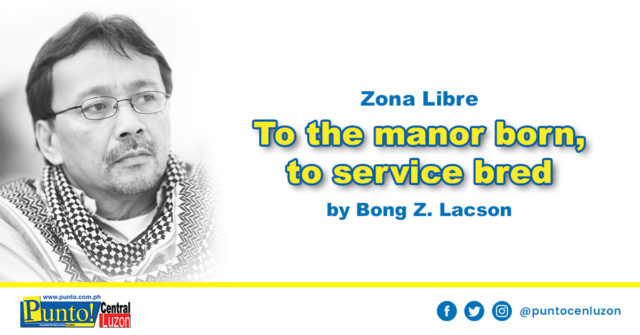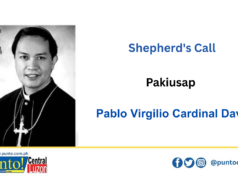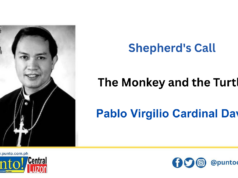THERE IS something about Pogi Lazatin. And for that matter, about his brother Jon too.
For one, both carry the name of their now dearly lamented father, Carmelo, aka Tarzan: distinguished by Jr. for Pogi, the Angeles City councilor and mayoralty bet; and II (the second) for Jon, the re-electionist Pampanga first district congressman.
Bearers of an illustrious name, Pogi and Jon are by right inheritors of wealth which immensity is measured in acreage, in property, in commerce.
Of even weightier substance and greater significance though, Pogi and Jon are heirs to a legacy of goodness, if not greatness, in public service.
That legacy bequeathed directly to them by their father, that which he built in his four terms as representative of the first district of Pampanga, and three-term mayorship of Angeles City, and yes, as chair of the city’s premier barangay Balibago.
That legacy inherited by their father from their grandfather Don Rafael Lazatin, dubbed in his time as “the grand old man of Pampanga politics,” for his unparalleled political career as governor, assemblyman, and city mayor through the most tumultuous periods of history from post-WWII, through the Huk rebellion, the struggle against the Marcos dictatorship, the euphoria of EDSA, abutting to the Mount Pinatubo devastations.
As the life and times of Cong Tarzan are too recent – and too good — to recede in the public memory, it is the era of Apung Feleng that needs refreshing. As much for the generation that came after his passing, as for Pogi and Jon, if only to impact upon them that legacy they have to live up to – the Tatak Lazatin they were born with.
Not much of a stirring, much less encompassing, eulogy is this Zona Libre column in The Voice published in its November 21- 27, 1993 issue. It passed muster though as a tribute then, and maybe as aide memoire now.
A noble man
AN ANOMALY in the Philippine political setting: the absolute antithesis to the patented Filipino politico. He abhorred pomposity, shunned power, disdained aggrandizement.
He was fiercely loyal to his God; staunchly defended, cared for his people; loved deeply his city.
He was a patrician in every sense of the word. Born to the local aristocracy and bred in that class that gave the world the despised caciques, the heartless hacienderos and the vainglorious bourgeoisie. In that world, yet he was never of that world.
He loved the soil and its tiller, carrying on a lifetime affair with the grains, the beasts of burden, and the trees. Marxist or otherwise, he was a “traitor” to his class.
His ultimate “betrayal” monumentalized with the foundation of his school that catered to the bright and promising sons and daughters of the dispossessed, empowering them with respect, the dignity and the means with which to rise from the curse of want to which the feudal system condemned their forebears.
It was not a stroke of gimmickry that his election token came to be a big red heart. It came from a grateful people who swept him to the Pampanga Capitol in the ‘50s, to the Angeles City hall in the ‘70s and the halls of the Batasang Pambansa – even as a septuagenarian bagets – in the ‘80s.
This is not to say that he never lost a battle. Magnanimous in victory, he was also most gracious in his political defeats.
But the principles by which he lived were unbending. As ramrod-straight as his posture. As hard as the kamagong cane which he periodically wielded to assert hizzoner’s authority over recalcitrant lawbreakers and recidivists.
A man of peace, he did not find any need for even a single guard. Moving around, even at the height of the Huk movement, by his lonesome. Why, he was said to have routinely taken public transport going to his office at the Capitol.
An administration devoid of the crudest plan to rehabilitate a devastated constituency and self-satisfied with empty mouthings of Philippines 2000 ought to be shamed by the reality of an Angeles Year 2000 Plan, crafted at the behest of this visionary in the mid-70s. (I should know, being a representative of a national government agency at the Regional Development Council then, where the plan was presented, approved and incorporated to the Central Luzon Medium Term or 25-Year Plan).
The pettiness and inanities of local officials in their vain efforts to exude power find glaring magnification when ranged against the simplicity of this man.
He was a millionaire many times over, but on his induction as director of the Philippine Air Lines in 1987, he promptly took the bus to Manila after finding his old reliable car had broken down.
While the crop of local raiders, er, leaders, would rather die than get caught riding in something less than a Galant Super Saloon or a Vanette, he regularly made the rounds in a battered pick-up truck. Sic transit Gloria mundi?
It is often said, and said so rightly, that a tribute is always inadequate. It can never encompass the true greatness of the man. It can only focus on what was in the man and his deed that touched the tribute-giver deeply.
Many men, even the few good ones, enter politics, get enmeshed in its corrupting power, and leave maculated beyond moral recognition. His was a reversion of that vicious routine.
Don Rafael Lazatin entered politics and ennobled it. Only goodness followed his long political trail. There impacts Apung Feleng’s greatness.
At his burial, I, who have met him less than ten times, and perhaps one he would not even remember, was moved to shed a tear or two.
Not so much for one man’s passing, but for the extinction of a most noble breed. Of whom, this city, this province, and this country seem forever deprived.
APUNG FELENG. Cong Tarzan. Pogi and Jon. The Lazatin legacy has been passed to a new generation. It shall not only be kept, but upheld. On high.
Preordained, enshrined, as it is in the Tatak Lazatin – to the manor born, to service bred. Hence, the heart – for the people, of the people.





